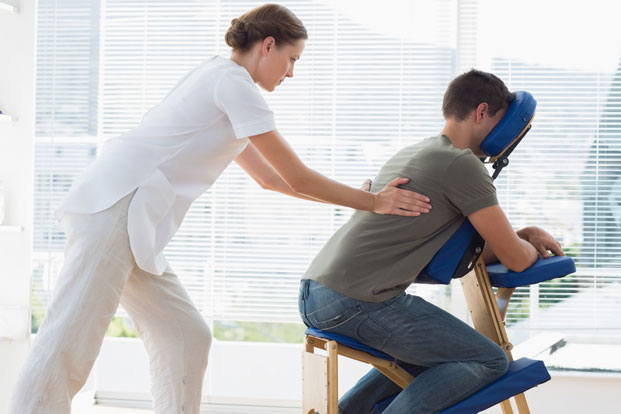Humans are tactile animals. Ever since we first developed opposable thumbs, we’ve enjoyed the thrill of rubbing our hands on each other as a way to stimulate the body and bring deep relaxation to the stressful human condition.
The definition of massage that we use today comes from a French word that means “friction of kneading,” the literal way your body experiences a massage. The practice has been around even longer than the French language. There are hieroglyphics dating back to the year 2300 BC that shows people attending to their hands and feet with what appears to be a massage, and there is other historical evidence of massages in such far-flung cultures as China, Mesopotamia, India, Korea and Japan.
In short, massage is part of our human culture, a way to experience the intimacy of human contact while bringing some level of stress reduction. But there’s more than pleasure involved – there are believed to be actual health benefits to massage.
One thing is certain – getting a massage is an increasingly popular thing to do. The American Massage Therapy Association, a non-profit organization that advocates for the benefits of the art and serves as a trade organization for its practitioners, estimates that nearly $12 billion was spent in 2014 on massage therapy. The AMTA estimates that between July 2013 and July 2014, an estimated 32 million Americans had at least one massage.
DIFFERENT STROKES
There are various types of massages that you can obtain. The most popular in the U.S. is the Swedish massage, a deep-tissue rubdown that used to work out the kinks in your muscles and bring relaxing endorphins rushing through the body.
There’s also Shiatsu massage, which means “finger pressure” in Japanese, its country of origin. The practitioners of shiatsu uses pressure on precise body points to bring relieve. These points are called acupressure points, and in the shiatsu tradition, are believed to be the locus of energy flow throughout your body energy, which is called chi. If you have psychic blockages at these points, shiatsu massage can unblock them and restore harmony.
Then there’s Thai massage, wherein the massager uses her or his body to move the patient into various positions. This is a takeoff on the practices of shiatsu massage and follows the same basic philosophy, wherein acupressure points can be relieved of their blockages and harmony restored. It’s a bit more physical, though, and is usually followed by a shower.
You also may consider hot stone massage. As the name would indicate, the masseuse places lightly warmed stones on acupressure points throughout the body, hoping to unblock the energy sources within. Sometimes the stones are manipulated, but often they are left in place merely to provide soothing warmth to the regions where they’re applied.
Massage enthusiasts may consider reflexology, which focuses on the thumb, fingers and hands to stimulate other areas, particularly the feet, which are believed to be linked to the rest of your body.
Finally, there are pregnancy massages, designed to relieve some of the accompanying physical changes that occur during this transition.
Also on the list of potential massages is the Aromatherapy Massage, which combines scented oils with vigorous rubdowns, all hoping to energize and reduce stress in your weary body.
HEALTH BENEFITS OF MASSAGE
Although some doctors believe massages are not backed by science, many do believe the psychological benefits can yield some real physical health benefits. Particularly for arthritis sufferers, the movements and manipulations of massage can prevent stiffening joints from becoming immobilized through disuse and bring some relief to the patient.
At the least, this alternative to traditional treatments has been proven in studies to reduce stress, lessen pain and relax certain muscles.
Among the health benefits massage adherents claim:
1) Lessening anxiety – We live in a world where daily living constantly stresses us out. Work, school, commuting and a constant barrage of noise can induce a high level of anxiety. Taking the time to relax with a massage can be as effective as meditation.
2) Fibromyalgia — This chronic painful condition is very hard to diagnose and even harder to treat. It encompasses a variety of ailments and concerns. Again, the relaxation induced by a good massage has therapeutic benefits.
3) Insomnia — Massage is a passive activity, and many fans of the art claim that they sleep much more soundly once a skilled massage chases stress away.
4) Sports injuries — Fluid buildup in afflicted joints and stiffened areas can be manipulated successfully so that a licensed massage therapist can initiate healing. It’s why so many professional sports teams have a massage therapist on call in the locker room.
5) Digestive disorders – A bit harder to prove, but de-stressing through massage is one way to unblock energy at your acupressure points and get things flowing through the body. Your digestive system is part of that flow.
There are some conditions that may make getting a massage inadvisable. These include bleeding issues, open wounds, deep vein thrombosis, broken bones or severe osteoporosis. All of these conditions may be negatively affected by manipulating the afflicted areas. It’s best to discuss your plans for massage therapy with your doctor and go over any objections before embarking on your planned course of action.
No matter which massage you choose, you likely will enjoy the intimate human contact. That’s as true today as it was in 2300 BC, when it all began. There are immense therapeutic benefits that accompany a feeling of general well-being, and while the scientific community may debate cause and effect, those who enjoy massages believe that they derive enormous benefits from the times when they lie on the massage table. That is powerful testimony that goes beyond science.

Leave a Reply